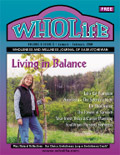Archives
Volume 9 Issue 5— January/February 2004

Living in Balance
The Art of Taking Care of Oneself
by Gwen Nyhus Stewart
Benjamin Franklin wrote: "If
you want to enjoy one of the greatest luxuries in life, the
luxury of having enough time, time to rest, time to think
things through, time to get things done and know you have
done them to the best of your ability, remember, there is
only one way. Take enough time to think and plan things in
the order of their importance. Your life will take on a new
zest, you will add years to your life, and more life to your
years. Let all your things have their place."
When you read Franklin's words, what do they mean to you?
Do you have enough time to balance your personal needs with
your commitment to the outside world? Is stress causing havoc
in your life? What exactly does it mean to have your life
in balance and how do you achieve it?
Read the article
Let's
Eat Pumpkin
by Paulette Millis
Pumpkin is native to the Americas. Parts of the skin, seeds,
and stem have been found in the ruins of ancient cliff dwellings
in South Western USA. The name appears to come from the Greek
word, "pepon," and the French word, "pompion."
Botanically, pumpkin is a squash – a cousin to melons
and cucumber – that grows on a low trailing vine. Its
use as a lantern has become a symbol of Hallowe'en, and in
a pie, a symbol of Thanksgiving, both of which date back to
the first colonial settlers. These early settlers found the
Indians boiling and baking pumpkins, making them into soups,
drying them, and grinding them into a meal for bread.
Read the article
Ayurveda
– The Science of Life
An Ancient Medicine
by Dr. Ranvir Pahwa
Ayurveda is the oldest science of medicine. The word is comprised
of two Sanskrit words: "ayur." meaning life, and
"veda," meaning science (i.e. the science of life).
It is the science of longevity – knowledge designed
to prolong life, and to promote health, growth, and happiness.
It originated in India and has become an integral part of
their society, where it teaches people how to be healthy,
wealthy, and wise in any circumstance. Ayurveda's medicinal
knowledge was also passed on to the Greeks, Chinese, Japanese,
and Tibetans, and eventually spread to the Middle East and
the South Pacific. More than twenty years ago, amidst the
growth of Western Medicine and along with other complementary
and alternative modalities, Ayurveda had its seeds sown in
North America, and now its fruits are slowly emerging.
Read the article
Jin
Shin Jyutsu
A Journey Toward Self-Knowledge and Harmony
by Shari Beckton
Is this another martial arts form? No, it is not. Jin Shin
Jyutsu Physio-Philosophy is an ancient healing art that offers
a simple way to achieve health and balance. It harmonizes
and brings balance to the energy of the body, which promotes
optimal health and well-being. This facilitates our own profound
healing capacity. The actual translation of “Jin Shin
Jyutsu” is, "The Art of the Creator expressed through
a person of compassion and knowing." Mary Burmeister,
author of several texts on this ancient art and a devoted
student of it, believes that Jin Shin Jyutsu is a lifelong
journey toward self-knowledge and harmony.
Read the article
Your
Inner Voice is a Key to Career Planning
by Jennifer Holmes
“Follow your passion!” “Don’t be
shy, just be yourself!” “You’re so good
with children, you should go into day care.” These are
common pieces of advice from armchair career specialists.
They have good intentions and they genuinely want the best
for you. However, I challenge these statements. They are contradictory,
not complete, and presumptuous. For example, “Don’t
be shy, just be yourself!" is something I heard a lot
when I was young. If you are shy, you are
being yourself. “You’re so good with children,
you should go into day care.” No one has the right to
say what you are good at, what your interests are, and what
skills you should utilize. This brings me to the first statement,
“Follow your passion!" This is easy enough advice
to give, but many people choose to seek career planning because
they are unclear, or out of focus, and need to first discover
what their passion truly is before they can follow it.
Read the article
Editorial
by Melva Armstrong
Another new year has arrived and I'm wondering what happened
to the last one. The days, weeks, months, and seasons seem
to fly by like a race car at the Indy 500. We can't stop the
movement so I guess it's best to get inside the race car and
enjoy the ride. I don't believe this fast-paced world is going
to slow down anytime soon, so we have to find our own way
of existing comfortably and happily within it. For me, it
becomes a matter of being constantly alert and vigilant to
my own daily requirements for balance, and then making sure
I discipline myself to maintain them for my ongoing health
and wellness. I also need to ensure that I stick to my own
pace so I don't get sucked up into the whirl-wind of activity
and chaos going on around me. (This isn't an easy task, as
you may well know.) It is that balance
in life, however, that is so important to all of us, because,
without it we are unbalanced and, according to many ancient
and modern complementary therapies and philosophies, it is
the imbalance that creates our sickness and unhappiness.
Read the editorial
Plus:
The Power of Sanskrit
SoulViews Presents Seminars - to expand the mind and body,
heart and spirit
Natural Reflections - Our Choice: Evolutionary Leap or Evolutionary
Crash?
News of Note
From Our Readers
|
